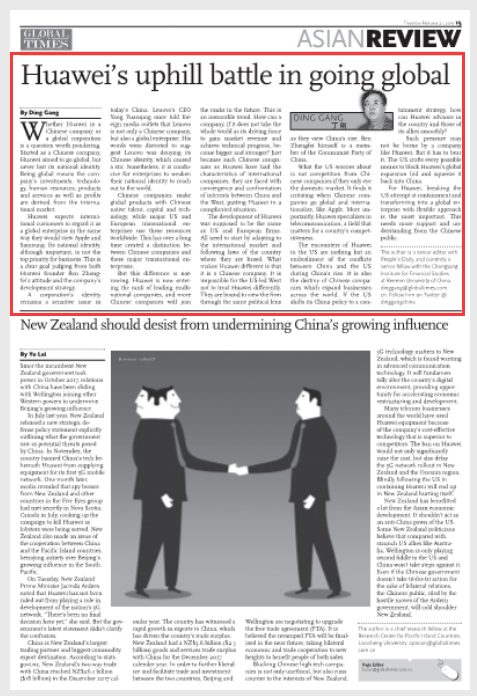Major Power Relations
Your Present Location: PROGRAMS> Major Power RelationsDing Gang: Huawei’s uphill battle in going global
By Ding Gang Source: Global Times Published: 2019-2-20
Whether Huawei is a Chinese company or a global corporation is a question worth pondering. Started as a Chinese company, Huawei aimed to go global, but never lost its national identity. Being global means the company's investments, technology, human resources, products and services as well as profits are derived from the international market.

Huawei expects international customers to regard it as a global enterprise in the same way they would view Apple and Samsung. Its national identity, although important, is not the top priority for business. This is a clear goal judging from both Huawei founder Ren Zhengfei's attitude and the company's development strategy.
A corporation's identity remains a sensitive issue in today's China. Lenovo's CEO Yang Yuanqing once told foreign media outlets that Lenovo is not only a Chinese company, but also a global enterprise. His words were distorted to suggest Lenovo was denying its Chinese identity, which caused a stir. Nonetheless, it is conducive for enterprises to weaken their national identity to reach out to the world.
Chinese companies make global products with Chinese native talent, capital and technology, while major US and European transnational enterprises use these resources worldwide. This has over a long time created a distinction between Chinese companies and these major transnational enterprises.
But this difference is narrowing. Huawei is now entering the rank of leading multinational companies, and more Chinese companies will join the ranks in the future. This is an inexorable trend. How can a company, if it does not take the whole world as its driving force to gain market revenue and achieve technical progress, become bigger and stronger? Just because such Chinese companies as Huawei have had the characteristics of international companies, they are faced with convergence and confrontation of interests between China and the West, putting Huawei in a complicated situation.
The development of Huawei was supposed to be the same as US and European firms. All need to start by adapting to the international market and following laws of the country where they are based. What makes Huawei different is that it is a Chinese company. It is impossible for the US-led West not to treat Huawei differently. They are bound to view the firm through the same political lens as they view China's rise. Ren Zhengfei himself is a member of the Communist Party of China.
What the US worries about is not competition from Chinese companies if they only eye the domestic market. It finds it irritating when Chinese companies go global and internationalize, like Apple. More importantly, Huawei specializes in telecommunication, a field that matters for a country's competitiveness.
The encounters of Huawei in the US are nothing but an embodiment of the conflicts between China and the US during China's rise. It is also the destiny of Chinese companies which expand businesses across the world. If the US shifts its China policy to a containment strategy, how can Huawei advance in the country and those of its allies smoothly?
Such pressure may not be borne by a company like Huawei. But it has to bear it. The US crafts every possible means to block Huawei's global expansion bid and squeeze it back into China.
For Huawei, breaking the US attempt at containment and transforming into a global enterprise with flexible approach is the most important. This needs more support and understanding from the Chinese public.
The author is a senior editor with People's Daily, and currently a senior fellow with the Chongyang Institute for Financial Studies at Renmin University of China.























































































 京公网安备 11010802037854号
京公网安备 11010802037854号





